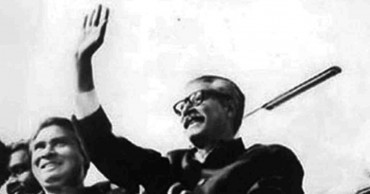Homecoming Day
Sheikh Hasina’s 43rd Homecoming Day today
Today marks the 43rd Homecoming Day of Awami League President and Prime Minister Sheikh Hasina.
On May 17, 1981, Sheikh Hasina returned home from India, after nearly six years in exile, following the brutal assassination of Father of the Nation Bangabandhu Sheikh Mujibur Rahman and most of his family members by some misguided army officers on August 15, 1975.
Both daughters of Bangabandhu -- Sheikh Hasina and Sheikh Rehana -- survived as they were in Germany at the time.
Also read: Sheikh Hasina’s return ushered in a new era for Bangladesh: Joy
Hasina was elected president of Awami League in her absence at the party's national council held on February 14-16, 1981.
Awami League and its associate bodies have chalked out various programmes to mark the day.
2 years ago
Bangladesh Embassy in Washington DC observes Bangabandhu’s Homecoming Day
The historic Homecoming Day of Father of the Nation Bangabandhu Sheikh Mujibur Rahman was observed at the Bangladesh Embassy in Washington DC in a befitting manner.
Bangabandhu, the undisputed leader of the nation, returned to independent Bangladesh via London and New Delhi on January 10 in 1972 -- after 290 days of confinement in a Pakistan jail.
Read more: Bangabandhu’s Homecoming Day observed in New Delhi
The embassy arranged a program to observe the historic day and paid homage to the great architect of Bangladesh's independence.
The day’s program started with placing of a floral wreath at the bust of Bangabandhu by the embassy officials led by Charge d’Affaires of the Embassy, Ferdousi Shahriar.
The messages of President Abdul Hamid and Prime Minister Sheikh Hasina were read out by the Defence Attaché Brigadier General Md Shahedul Islam and Minister (Political-II) Md Rashedujjaman.
3 years ago
The Triumphant Return of the Greatest Bengali
Bangabandhu Sheikh Mujibur Rahman returned to the conquered country 25 days after independence of Bangladesh - on January 10, 1972. There is no such homecoming in the history. Homecoming is not just a come back to 'sweet home,' a return to the country, the soil of the country, and the people after a lifelong struggle to finally return to the firm hope of building a dream-Sonar Bangla (Golden Bengal). Waiting for 28 days (9 months 12 days) to return home as a winner, while in the prison in Pakistan it was either death, or freedom. No, not death; Sheikh Mujib made the independence of his men and motherland after about 23 years of struggle, and a total of 13 years of imprisonment. He faced execution twice (1969 and 1971) but survived to implement the country's independence.
When the Bengalis was united for independence at the call of Bangabandhu, the Pakistani military launched a brutal attack on the night of March 25, 1971 on the independence-loving Bengalis and arrested Bangabandhu from his Dhanmondi residence on March 26 at 1.20 pm, shortly after he declared the independence of Bangladesh. He could have escaped if he wanted to. But Bangabandhu was not such a man. In an interview with British journalist David Fraser, he made it clear: 'I thought it is better I die and at least save my people who love me so much. I am their leader, I will embrace death if necessary, but why should I escape? 'However, after the victory of Bangladesh, on international pressure Bangabandhu was released from prison on the morning of January 8, 1972. After his release, he returned to the country on January 10, 1972, via London and Delhi. When the plane carrying Bangabandhu touched the runway of Tejgaon Airport that afternoon, countless crowds greeted their undisputed leader with cheers and sky-scraping 'Joy Bangla' slogans. Bangabandhu went to Suhrawardy Udyan (then Racecourse Maidan) straight from the airport, where he one day urged millions of Bengalis to jump into the freedom struggle. There, he congratulated the country's people in an emotional voice for snatching victory in the bloody liberation war and called upon all to dedicate themselves to rebuilding the war-torn country.
Read More: Bangabandhu’s Homecoming Day today
As soon as he returned to the country on January 10, 1972, getting him back alive millions of Bengalis welcomed him at the historic Suhrawardy Udyan, where once he called for independence ten months back. He firmly called upon people, "If my people are killed again, then my request to you is: 'build fortress in every home'. In his words, the desire to liberate the motherland has fascinated the whole nation, provoked, 'Remember, since we have given blood, we will give more, by we will surely liberate liberate the people of this country, inshallah.' He emphasized, 'The struggle this time is the struggle for our liberation. The struggle this time is the struggle for our independence.' After returning to the country, the father of the nation started tidying up the country. In the beginning, he gave his focus in formulating the state policies- the principles on which the new country Bangladesh would be governed. Mujibbad gave a remarkable imprint of the life, culture, and heritage of the land and people of the country in politics, gifted with his political experience, wisdom, foresight, and the uniqueness of independent Bengal.
He was not unaware of the plight of ordinary people in the war-torn country. He expressed his determination to alleviate their suffering as follows: "From today my request, from today my command, from today my order, as a brother-not as a leader, nor as to the president or as the prime minister, I am your brother, you are my brothers. This independence of mine will be futile-if the people of my Bengal are not fully fed on rice, this independence of mine will not be fulfilled-if the mothers and sisters of Bengal do not get clothes, this independence of mine will not be fulfilled-if the mothers and sisters of this country do not get clothes for the protection of their modesty, this independence of mine will not be fulfilled-if the people of this country, the youth of mine, do not find employment or do not get jobs."
Read More: Anne de Henning’s rare photos of Bangladesh’s birth, Bangabandhu to have Dhaka exhibit Dec 15-24
The drafting of the constitution reflected the idea of local, and not the imitation of other developed countries. The views of the people were reflected in the constitution; 98 recommendations were adopted on the basis of public opinion. Bangabandhu always emphasized the will and needs of the people first. In just nine months, Bangabandhu presented the nation with one of the world's best constitutions, which was adopted by the National Assembly on November 4, 1972, and came into effect from December 16 (Victory Day). Speaking on the constitution in the parliament, the country's architect said: "This constitution is written in the blood of the martyrs. This constitution will survive as a tangible symbol of the hopes and aspirations of the entire people."
It is unknown whether anyone else in history got a chance to speak about the passion and love that Bangabandhu expressed at the people's reception at all levels. Emotional Bangabandhu said at that auspicious time; my Bangladesh has become independent today. "My Bangladesh has been independent today, my life's desire has been fulfilled today, the people of my Bengal have been liberated today. My Bengal will remain free. Today I won't be able to make a speech. The way the sons of Bengal, the mothers of Bengal, the peasants of Bengal, the laborers of Bengal, the intellectuals of Bengal did struggle, I was imprisoned, was ready and waiting to go to the gallows. But I knew that they could not suppress my Bangalees. The people of my Bengal would be liberated."
Read More: ‘Intense, fragile, powerful’: Forbes effusively lauds Paris exhibit on Bangladesh’s birth, Bangabandhu
Sitting in a dark cell of a prison (multiple prisons - Karachi, Faisalabad) and dreaming of freedom, he was not sure he would return to his beloved motherland alive. "I did not know I would return to you", fascinated by the motherland, Bangabandhu uttered. "I have come. I did not know I was sentenced to death by hanging. A grave was dug for me beside my cell. I prepared myself, I said I'm a Bangalee, I'm a man, I'm a Muslim-who dies once not twice. I said, if death comes to me, I'll die laughing."
Although Bangabandhu was imprisoned in Pakistan from March 26, 1971 to January 8, 1972 (9 months and 12 days), obviously he was alive in Bangladesh's consciousness and liberation struggle, and inspired them for nine months. He was the President of the Mujibnagar Government and the first President of the country. In his physical absence or absence, the four national leaders conducted the Mujibnagar government i.e., the war of liberation, by embracing his ideals, thoughts, and consciousness.
Although he was in prison in Pakistan, he was not unaware of the atrocities that the Pakistanis had inflicted on the Bengalis in the nine-month war. Mentioning that 3 million people have been killed in the war, Bangabandhu aggrieved, "In the Second World War and also in the First World War, such a number of people, such a number of common citizens did not die, were not martyred, which happened in my 7-crore people's Bangladesh." While in prison in Pakistan, he was never disturbed or intimidated by the thought of execution. His compassion for the country was expressed in his speech: "I told just one thing, I have no objection if you kill me. Please return my dead body to my Bangalees, this is my only request to you."
He was a prison, but he believed that no one could keep the Bengalis in suppress. Bangladesh would be independent. And so he prepared in his mind about what to build an independent country. That is why he did not have to hurry or take time to concentrate on the task of building a Sonar Bangla, including the drafting of the constitution in the earliest possible time.
The ruthless Pakistani military could not kill this great humane-the leader of the seven-crore Bangali. But he had to give his life in the hands of his 'loved' ones, in the plan of the very own traitors, while the chief mastermind Mushtaq sent the cooked the sand duck to Bangabandhu's home just two days ago (13 August). Who knew that this 'lovely' feast was also an exercise in plotting to assassinate Bangabandhu! By killing Bangabandhu, the murderous circle silenced his dream of Sonar Bangla. The Bangladeshi forms of politics that he has formulated in this country taken from the soil and people's lives was also blocked. When the people of Bangladesh, under the leadership of Bangabandhu, were determined to transform the country into Sonar Bangla in a democratic state system with a secular mindset of the 1970s, they stopped that progress by killing him and went back to the 'religion'-centric social divisions like the 1940s.
Read More: What Was Bangabandhu Sheikh Mujibur Rahman's Childhood Like?
But the killers did not know that Bangabandhu could be killed and could not be kept suppressed (dabay rakha). He was, is, and will, always be. That is why the people overthrew the then military government in the late 1990s, overcoming all obstacles and bearing his secular mentality. He has always been equally popular, no matter whether his party is in power or not. For example, in a 2004 BBC poll, Bangabandhu was elected the greatest Bengali of all time (then the BNP-led government in power (2001-2006)). In 2005, the High Court quashed the Fifth Amendment to the Constitution and ruled to restore the 1972 constitution, which was upheld by the Supreme Court in 2010. Meanwhile, since 2010, people have rallied in various places, including the capital, to restore the 1972 constitution. In this favorable environment, the government led by his daughter restored the main provisions of the 1972 constitution in 2011. In addition to any emergency of the Awami League, Bangabandhu is still more relevant and influential in any crisis of the nation. As long as Bangladesh, so long Bangabandhu. In fact, Bangladesh and Bangabandhu are synonymous.
On the question of Bangabandhu's relevance, Bengali economist and Nobel laureate Amartya Sen recently stated that 'Bangabandhu and his ideals are still relevant'. He further emphasized that Bangabandhu's philosophy and ideology should be imitated in the conflicting contemporary world, especially in South and South-East Asia. Bangabandhu's need for secularism and religious freedom in resolving ethnic and religious conflicts not only in Asia but also in the Western world is undeniable and socialist democracy is essential to build an exploitation-free society. The country lost its genuine architect and friend- Bangabandhu Sheikh Mujib a quarter century ago. But he was, is, will be in the arteries of Bengalis: "As long as Padma, Meghna, Gouri, Jamuna flows on, Sheikh Mujibur Rahman, your accomplishment will also live on."
Read More: Ideals of Bangabandhu Sheikh Mujib Can Inspire the Young Generation
Dr. Ala Uddin, Professor, Department of Anthropology, University of Chittagong. Email: [email protected]
3 years ago
Bangabandhu’s Homecoming Day today
Today (January 10) marks the historic Homecoming Day of Father of the Nation Bangabandhu Sheikh Mujibur Rahman, the greatest Bangalee of all time. The day is being observed across the country in a fitting manner.
President M Abdul Hamid and Prime Minister Sheikh Hasina have issued separate messages on the eve of the day, paying tributes to the Father of the Nation.
Prime Minister Sheikh Hasina paid homage to the Father of the Nation by placing wreaths at his portrait in front of Bangabandhu Memorial Museum at Dhaka‘s Dhanmondi-32.
After laying the wreaths, the Prime Minister stood in solemn silence for some time as a mark of profound respect to the memory of Bangabandhu, the architect of independent Bangladesh.
Read: Homecoming Day of Bangabandhu: PM pays tribute at Dhanmondi-32
Awami League (AL) has planned various programmes to observe the historic day.
AL’s programmes began with the hoisting of the national and party flags at the party’s central office, Bangabandhu Bhaban and its party offices across the country at 6:30am.
AL leaders and workers paid homage to Bangabandhu by placing wreaths at his portrait in front of Bangabandhu Bhaban in the city’s Dhanmondi area at 7:30am.
At 11 am, an AL delegation will pay respect to the undisputed leader of the nation by placing wreaths at his grave in Tungipara.
Read: Bangabandhu’s ‘Homecoming Day’ to be observed Tuesday
The AL delegation will include its presidium members Lt Col Muhammad Faruk Khan, central committee members Awowar Hossain, Shabuddin Farazi Iqbal Hossain Apu, Marufa Alter Popy, and Gloria Sarkar Jharna.
On the occasion, a discussion will be held on a limited scale at the party's central office in Dhaka’s Bangabandhu Avenue at 3:30 pm, maintaining the health safety guidelines while Prime Minister and Awami League President Sheikh Hasina will preside over the event.
Besides, all district, city, upazila, thana, union and ward level units of the AL, its associate bodies are organising similar programmes to observe the day in a befitting manner.
In a statement, AL General Secretary and Road Transport and Bridges Minister Obaidul Quader urged all party leaders, workers and its associates to observe all the programmes, marking Bangabandhu's Homecoming Day in a fitting manner.
Read More: Anne de Henning’s rare photos of Bangladesh’s birth, Bangabandhu to have Dhaka exhibit Dec 15-24
Bangabandhu, the undisputed leader of the nation and supreme commander of the country's Liberation War, returned to the newly independent Bangladesh after over nine and half months of captivity in a Pakistan jail on January 10 in 1972.
3 years ago
Bangladesh Embassy in Brussels celebrates Bangabandhu's Homecoming Day
The Embassy of Bangladesh in Brussels celebrated the 50th Anniversary of Bangabandhu's Homecoming Day virtually on Monday.
Father of the Nation of Bangabandhu Sheikh Mujibur Rahman returned to an independent Bangladesh on January 10, 1972, following 10 months of incarceration in a Pakistani prison, including the nine months of the Liberation War of Bangladesh in 1971.
READ: US Embassy dismisses BNP leader Hafizuddin's claim over sanctions on CEC
The Embassy of Bangladesh in Brussels shared the virtual conversation between Ambassador Mahbub Hassan Saleh and noted journalist and author Syed Badrul Ahsan on this occasion on its official Facebook page.
Syed Badrul Ahsan travelled along with Bangabandhu Sheikh Mujibur Rahman from the Old Airport in Tejgaon to the then Race Course Maidan (present Suhrawardy Udyan) in Dhaka on the day of his homecoming.
READ: S Korean community, embassy donate blankets, masks, confectionery to Shishu Paribar
4 years ago
Bangabandhu remembered on Homecoming Day
Speakers at a discussion on Monday remembered Father of the Nation Bangabandhu Sheikh Mujibur Rahman with much respect and emotion revisiting the historic moments as the country marked the Homecoming Day of Bangabandhu.
Foreign Minister Dr AK Abdul Momen spoke as the chief guest while State Minister for Foreign Affairs Md Shahriar Alam was a special guest at the discussion organised by the Ministry of Foreign Affairs at Foreign Service Academy.
Veteran Awami League leader and former Commerce Minister Tofail Ahmed; and UK Awami League Vice President and Study Circle, UK President Syed Mozammel Ali shared their memories with Bangabandhu and described each moment – Bangabandhu’s release from prison in Pakistan to his return to independent Bangladesh.
The defeated Pakistani rulers were compelled to free Bangabandhu in the early hours of 8 January 1972. He landed in London in the morning on the same day.
4 years ago
PM pays homage to Bangabandhu on Homecoming Day
Prime Minister Sheikh Hasina on Monday paid tributes to Father of the Nation Bangabandhu Sheikh Mujibur Rahman on the occasion of his historic Homecoming Day.
She paid homage by placing wreaths at the portrait of the Father of the Nation in front of Bangabandhu Memorial Museum at Dhanmondi.
Read: Bangabandhu’s Homecoming Day to be observed on Monday
After laying the wreaths, the Prime Minister stood in solemn silence for sometime as a mark of profound respect to the memory of Bangabandhu, the architect of independent Bangladesh.
4 years ago
Bangabandhu’s Homecoming Day to be observed on Monday
The nation will gratefully pay homage to Bangabandhu Sheikh Mujibur Rahman on Monday marking his historic coming to liberated Bangladesh after nearly 10 months of incarceration in a Pakistani jail. On January 10, 1972, some 25 days after the surrender of the Pakistan army in Dhaka, Bangabandhu set foot for the first time in free Bangladesh, after over nine-and-a-half months of captivity in Pakistan. Bangabandhu was subjected to inhuman torture in captivity, where he had been counting the days to the execution of a death sentence that was pronounced against him in a sham trial. Bangabandhu inspired the birth of Bangladesh. He was the inspiration for the freedom fighters. Even after Pakistan's surrender on December 16, the people felt restless and incomplete in the newly-independent nation until they had their leader back among them. Owing to his uncompromising leadership, Bangladesh achieved the ultimate victory through the nine-month Liberation War in 1971. The defeated Pakistani rulers were finally compelled to release Bangabandhu from jail. The victory of December 16 attained its fulfilment with his release. Bangabandhu flew back to in Dhaka via London and a brief stopover in New Delhi. Bangladesh Awami League has taken various programmes to observe the historic day. The AL leaders will pay homage at Bangabandhu’s portrait at Bangabandhu Bhaban at Dhanmondi -32 at 8.30 am. Besides, a delegation of Bangladesh Awami League will visit the mazar of Bangabandhu at Tungipara at 11 am. A discussion meeting will be held on Tuesday at 3:30 pm at the AL central office at 23 Bangabandhu Avenue where Prime Minister and AL president Sheikh Hasina will join through a video conference.
Read: AL chalks out programmes to observe Bangabandhu’s Homecoming Day In his message President Abdul Hamid said “As long as Bangladesh and Bengalis exist, Bangabandhu will be the source of inspiration for all. Today, Bangladesh is moving forward at an irresistible pace on the development highway under the leadership of Prime Minister Sheikh Hasina. Bangladesh has evolved from a least developed country to a developing country.” “If this trend of development continues, Bangladesh will become a developed and prosperous country by 2041,” he said. “Following the path of success in building 'Digital Bangladesh' by 2021, we will be able to move forward with more courage and confidence towards building a developed Bangladesh by 2041 - this is my expectation on Bangabandhu's Homecoming Day,” he added. In her message, the Prime Minister said, “The greatest Bengalis of all time in the history of Bengali liberation struggle, the Father of the Nation, Bangabandhu Sheikh Mujibur Rahman was released from prison in Pakistan and returned home on this day in 1972. The people of newly independent Bangladesh got back their most beloved leader. With the arrival of the Great Leader, the joy of the final victory of our liberation war was fulfilled.” She also urged all to uphold the spirit of independence achieved at a cost of three million martyrs and two million abused mothers and sisters. “Inspired by the motto of the Great Liberation War by resisting all imminent conspiracies, together, we shall play an effective role in building the 'Golden Bangladesh', the father of the nation's dream,” she said.
4 years ago
AL chalks out programmes to observe Bangabandhu’s Homecoming Day
Bangladesh Awami League has taken various programmes to observe Father of the Nation Bangabandhu Sheikh Mujibur Rahman's historic Homecoming Dayon Monday.
The ruling party leaders will pay homage to the portrait of Father of the Nation Bangabandhu Sheikh Mujibur Rahman at the premises of historic Bangabandhu Bhaban at Dhanmondi -32 at 8.30 am.
Besides, a delegation of Bangladesh Awami League will also pay homage at the grave of Bangabandhu at Tungipara at 11 am.
READ: 2021: A year of challenges for Awami League
A discussion meeting will be held on Tuesday at 3:30 pm at the AL central office at 23 Bangabandhu Avenue where Prime Minister and AL president Sheikh Hasina will join through a video conference.
READ: Khaleda always tried to wipe out Awami League, says Hasina
Bangabandhu returned to independent Bangladesh on January 10 in 1972, after over nine and half months of captivity in Pakistan jail.
4 years ago
PM suspended Khaleda's sentence out of humanity
Regarding various statements made by BNP leaders about Begum Khaleda Zia's illness, Awami League general secretary Obaidul Quader said Sheikh Hasina had suspended Begum Zia's sentence because of her humanity.
He said this while addressing a discussion meeting organized by Dhaka Metropolitan North Awami League on the occasion of Prime Minister Sheikh Hasina's Homecoming Day on Bangabandhu Avenue this morning.
He questioned the BNP leaders and said it is not humanity?
Also read: Khaleda still suffering from post-Covid complications: Doctor
Obaidul Quader further said that the BNP leaders did not even appreciate this humanity.
Obaidul Quader said the BNP has become a world champion in the politics of revenge with observance of Khaleda Zia's fake birthday by cutting a cake on the day of Bangabandhu's assassination on August 15.
Quader also said that there is no one else who has created this record.
He remarked that Bangladesh will be able to move forward at a relentless pace in the quest for development and prosperity by tackling the Corona crisis.
Referring to Sheikh Hasina as the most honest, courageous and humane leader in post-75 Bangladesh, Obaidul Quader said Bangabandhu's Bangladesh is a wonder of the world today under the farsighted leadership of Sheikh Hasina.
Mentioning that Sheikh Hasina has been successfully leading the party for the last four decades as a symbol of unity of the Awami League, the General Secretary of the Awami League said that Sheikh Hasina has come a long way and stood on the rubble and repeatedly triumphed over life.
Also read: ‘Vindictive politics’ behind govt’s negative decision on Khaleda: BNP
Noting that Bangladesh has evolved from a least developed country to a developing country today with the return of Sheikh Hasina, Obaidul Quader said it is another golden feather in the crown of Sheikh Hasina's success.
Dhaka Metropolitan North Awami League President Sadek Khan presided over the meeting at Bangabandhu Avenue while Awami League presidium member Jahangir Kabir Nanak, joint secretary Mahbubul Haque Hanif, organisational secretary Mirza Azam also spoke among others.
4 years ago














